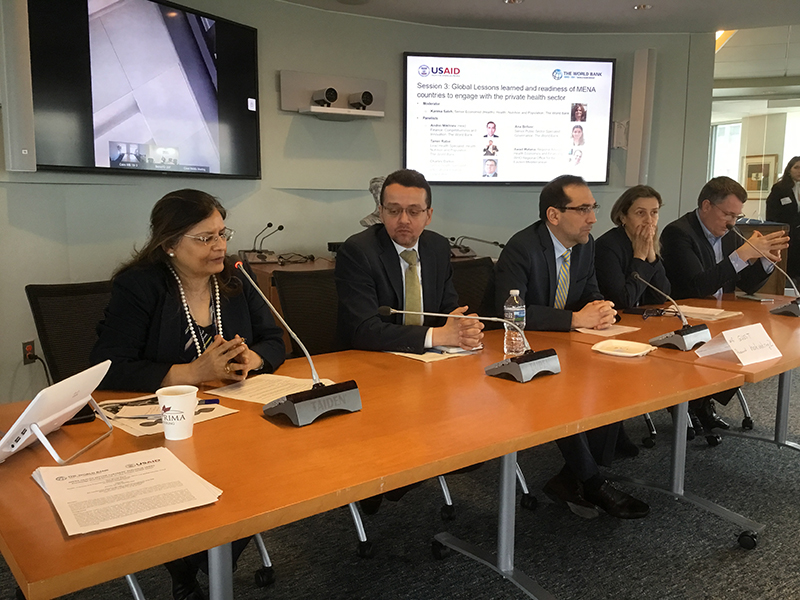Private health sector partners share knowledge on the Middle East

On March 20, 2019, USAID and the World Bank, with support from SHOPS Plus, convened a group of experts to share knowledge on the private health sector in the Middle East and North Africa (MENA) region. The meeting of partners focused on identifying gaps and opportunities for engagement.
Despite progress made in recent decades in developing health systems and improving the overall health and life expectancy of populations, the region faces substantial health challenges. Costly non-communicable disease are on the rise, and their burden is further compounded by ongoing conflicts and refugee crises that are straining the health systems of the host countries. The response to these complex challenges requires strong health systems that are able to provide equitable, affordable, and quality care to all citizens and displaced populations. Harnessing the private health sector’s strengths and potential contributions to complement overstretched public resources is key to improving health outcomes.
With the aim of exchanging information and identifying priorities to strengthen the private health sector, the meeting brought together representatives of SHOPS Plus, USAID, the World Bank, the International Finance Corporation (IFC), the World Health Organization, the United Nations Children’s Fund, and technical partners. In the words of Charles Lerman, USAID, who introduced the program, "To our knowledge, this is the first time that this kind of event has been held on the private health sector in the MENA countries with this particular constellation of health actors."
Gaps in knowledge
Aye Aye Thwin, USAID, chaired a session which focused on sharing evidence on the private health sector in the MENA region and identifying gaps in knowledge. Marianne El-Khoury, SHOPS Plus research, monitoring and evaluation lead, presented the findings and recommendations from a recent SHOPS Plus report on health financing and the private health sector in the region. She noted the wide range of private health sector actors in the region, from state of the art facilities that are destinations for medical tourism, to those set up by local NGOs assisting refugees, and everything in between. El-Khoury stressed the need for solutions to be tailored to the specific context of each country.
Plans for the future
The partners discussed a number of ways to exchange information and coordinate activities to address priorities in the region, and agreed to continue the dialogue. Organizers of the meeting expressed the intention to hold more events in the near future on topics of mutual interest.
Learn more about the SHOPS Plus study: Shining a light on health financing and the private sector in the Middle East and North Africa
Read the primer: Health Trends in the Middle East and North Africa